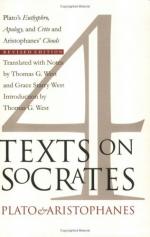
|
| Name: _________________________ | Period: ___________________ |
This quiz consists of 5 multiple choice and 5 short answer questions through Plato's Crito.
Multiple Choice Questions
1. What is Euthyphro's second definition of piety?
(a) Piety is behaving honorably despite ill fortune.
(b) Piety is fearing own's own mortality.
(c) Piety is engaging in skillful service on behalf of the gods.
(d) Piety is preparing oneself for great rewards.
2. Which is one of the popular theories for why Socrates advanced a lackluster defense at his trial?
(a) He wished to be martyr.
(b) He wished for the art of philosophy to die with him.
(c) He was worried about being unable to care for himself in old age.
(d) He proceeded out of principle.
3. To Socrates, what would illegally breaking out of prison constitute?
(a) Piety.
(b) The rule of law.
(c) Justice.
(d) Retaliation.
4. What is Socrates illustrating with his choice to stay in Athens rather than flee?
(a) His innate cowardice.
(b) His eagerness to experience death.
(c) His acceptance of the duty to obey the law.
(d) His loyalty to his friends.
5. According to Socrates, the philosopher who tells the truth ... ?
(a) Will be feared.
(b) Will be hated.
(c) Will be loved.
(d) Does not exist.
Short Answer Questions
1. Why does Socrates object to the notion that piety is a system of exchange between gods and men?
2. What is Euthyphro's father accused of?
3. According to Socrates in Crito, what happens when individuals disagree on the matter of obeying or disobeying laws?
4. What does Socrates believe about the concept of objective truth?
5. What would happen if Socrates fled to a city that was well-governed?
|
This section contains 385 words (approx. 2 pages at 300 words per page) |

|




